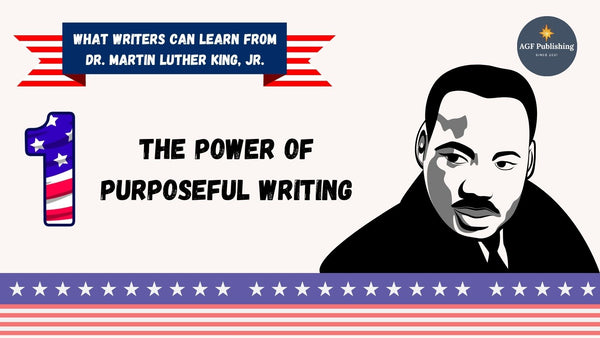
The Power of Purposeful Writing
Dr. Martin Luther King, Jr. was more than an influential speaker—he was a writer whose words carried the weight of a profound mission. Every sermon, letter, and speech he crafted reflected his unwavering dedication to justice, equality, and human dignity. For writers, King’s legacy offers a valuable lesson: writing with clear intention and purpose has the power to inspire and transform.
King’s “I Have a Dream” speech wasn’t just beautifully written; it was carefully designed to ignite action and paint a hopeful vision of the future. His “Letter from Birmingham Jail” addressed critics directly, using reason, moral authority, and emotional appeal to make his case for civil rights. These were not random expressions but deliberate, purposeful writings. This raises an essential question for every writer: Why am I writing this? What impact do I want to have?
Purposeful writing doesn’t require grand platforms or political causes. Whether you’re crafting a novel, blog post, or personal essay, writing with intention means knowing the “why” behind your work. King’s approach reminds us that even small stories can create ripples if they reflect authenticity and a desire to connect with readers.
Action Steps for Writers:
-
Clarify Your Purpose – Before starting any writing project, ask yourself:
- What is the message I want to convey?
- Who am I writing for, and how do I want them to feel or think differently?
- How does this project reflect my values or personal experiences?
-
Write a Mission Statement for Your Project – Just like a company defines its purpose, craft a one- or two-sentence mission statement for your writing. It could be as simple as: “I want to help readers feel hopeful” or “This story will explore themes of resilience and love.” Refer back to this statement when you feel stuck or lose focus.
-
Engage with Topics You’re Passionate About – King’s writing was powerful because it came from a place of deep conviction. Write about subjects that stir your heart, even if they feel personal or challenging. Passion translates to authenticity on the page.
-
Edit with Intent – As you revise, ask:
- Does every paragraph serve the overall purpose?
- Am I staying true to the message I set out to share?
- Is the tone aligned with my goals—does it persuade, inform, or inspire as intended?
-
Invite Feedback – Share your work with someone who understands your goals. Ask them if the writing feels purposeful and if the message comes across clearly. Adjust based on their insights.
Writing with intention doesn’t mean every piece needs to tackle social justice or major issues. It simply means that every word, scene, and argument reflects thoughtfulness and a desire to make a difference, no matter how big or small. When writers embrace this approach, their work carries the power to resonate, uplift, and inspire lasting change—just like Dr. King’s did.
#PurposefulWriting #DrKing #WritingWithIntention #InspireChange #WritingTips #MissionDrivenWriting #Authenticity #WritingGoals #ConnectWithReaders #Storytelling #EmotionalImpact #ClarifyPurpose #PassionInWriting #EditWithIntent #TransformativeWords #WriteWithHeart #EmpathyInWriting #PowerOfWords #WritingMission #WritingInspiration

